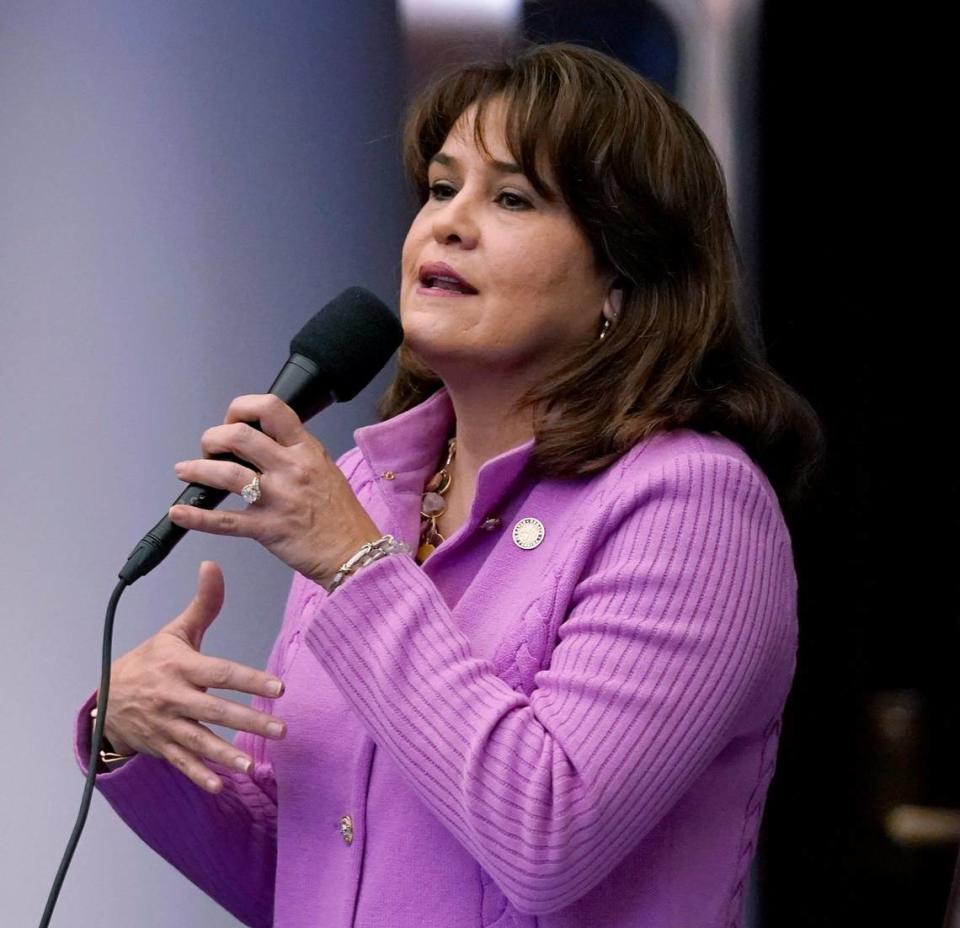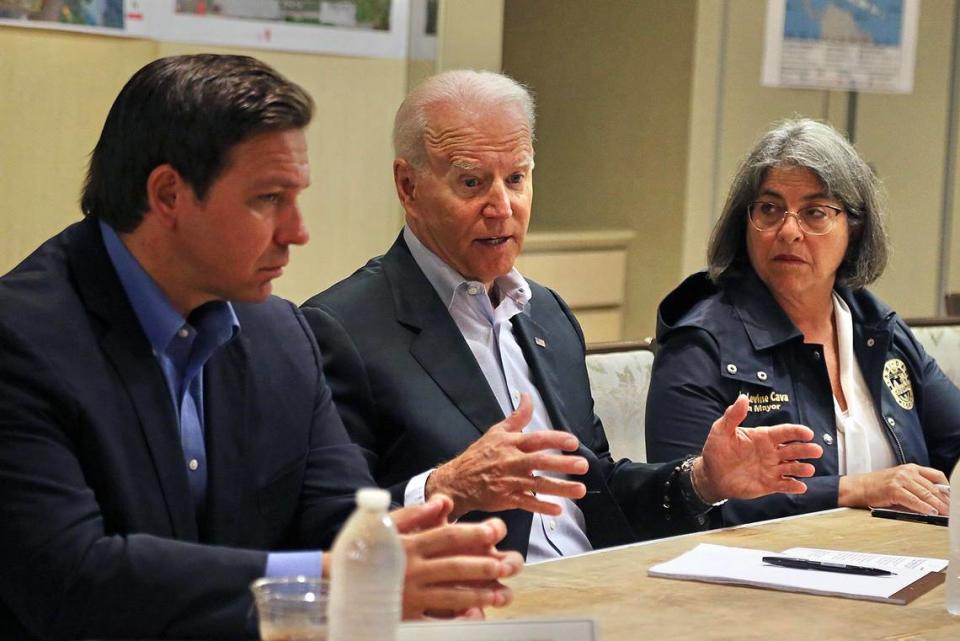Another Dem candidate for governor, a search for election conspiracy, and a fired police chief
It’s Monday, Oct. 18, and one more Democrat wants to remind you there’s an election next year for who will reside in the governor’s mansion.
That Democrat is Miami state Sen. Annette Taddeo, who will make it official today that she’s running to become the Democratic nominee for governor in 2022. Taddeo, 54, is expected to file her campaign documents with Florida’s Division of Elections on Monday morning.

Taddeo will enter a Democratic field dominated by Nikki Fried and Charlie Crist. Gov. Ron DeSantis has announced he’s seeking re-election but has failed to file the paperwork. Taddeo knows Crist, the former governor, well. She was selected as his running mate for his failed gubernatorial bid in 2014, when the former Republican ran as a Democrat. She’s hoping to become the first Latina candidate to earn a major party nomination for Florida governor.
WHAT WE’RE TALKING ABOUT

Top cop ousted: With confidence lost in their top law enforcement officer, Miami officially fired Police Chief Art Acevedo last week. Here’s how it went down: On Tuesday, Miami Mayor Francis Suarez spoke publicly for the first time in the three weeks since controversy erupted. Acevedo needed a lifeline. He got tossed an anchor instead as Suarez stood by the decision of City Manager Art Noriega to suspend the chief and recommend his firing to the commission. He called the drama “simply untenable and unsustainable” and an “unfortunate episode for the city of Miami.” On Thursday, the city commission voted unanimously to fire Acevedo, ending the shortest tenure for a Miami police chief in recent memory.
Revising selection process: Now, Acevedo’s ouster could rekindle debate over how Miami picks the city’s police chief. The top proposal: allow city commissioners to appoint a search committee and give the mayor a list he must choose from.

Clouding Suarez: Acevedo’s failed, tumultuous tenure also cast some shade on the city’s ambitious mayor. Suarez has not only sought to make a name for himself as the future of the Republican Party, he has tried to pitch to tech moguls that he helms a smoothly-run city where sunshine meets opportunity. But the episode exposed both the city’s volatility, and the limits of his power.
Election deniers push audit scheme: Across Florida, former President Donald Trump’s most ardent supporters are scouring communities for evidence of voter fraud in a state he won handily. Although once a vocal Trump supporter, DeSantis has so far dismissed the idea. He was then called an “election integrity denier” by some in the group. The organizers communicate via an encrypted messaging service called Telegram, popular with far-right conspiracy theorists, the Tampa Bay Times reported. But their theories, election officials say, show a lack of understanding of how voting works. “It’s like the last election didn’t end,” said Pasco County Supervisor of Elections Brian Corley.
Where’s the Hispanic outreach? Despite a saturated field and a Hispanic population percentage that mirrors Florida’s statewide average, the 11 candidates running in the special election for Florida’s 20th Congressional District don’t appear to be working very hard for Hispanic votes, organizers say. The district was previously held by longtime U.S. Rep. Alcee Hastings who died in April.
Was benefits break a bust? DeSantis’ administration ended $300-per-week federal unemployment benefits early to spur Floridians back to jobs. Did it work? Not entirely. Worker shortages persist and national studies show that ending the benefits early had minimal impact on job growth. Meanwhile, some Floridians who had their benefits end say they still haven’t found work.
WHAT WE’RE WATCHING

Politics of school boards: As the governor and Republican leaders across the state vow to make school board governance a ripe political issue next election year, we’re watching the Broward County School Board tiptoe cautiously as it decides on naming a permanent superintendent. Last week, the board agreed Interim Superintendent Vickie Cartwright has performed well since they selected her in late July, including her forthright defense of the district’s mask mandate in the face of aggressive sanctions from the DeSantis Administration and state Board of Education. But they’re now saying they want public input before they commit to giving her the job permanently.
Big maps, little public input: Florida’s Republican-controlled Legislature says it’s ready to discontinue the once-vaunted tradition of conducting public hearings before it draws new maps. They will instead rely on the public to submit comments and maps through a redistricting website. But in response to questions from legislators at meetings this week, they have made no commitment that they will review what they get.
More weak state contract oversight: Where was the oversight? It’s a refrain we ask time and again as journalists do more to reveal flawed, dangerous and potentially corrupt practices by companies contracted to do the state’s job than do agency heads and legislators. This week’s example comes, again, from the Department of Juvenile Justice. Contractor TrueCore Behavioral Solutions was found by DJJ’s Inspector General with “possibly systemic problems” after a riot led by juveniles trying to call attention to constant abuse. The company lost the contract at the Okeechobee Juvenile Offender Corrections Center, where the riot occurred, but managed to keep contracts worth $350 million at nine other facilities.
Improving COVID trends: A U.S. Department of Health and Human Services report on Sunday showed 3,001 COVID-19 patients listed from 255 Florida hospitals, continuing a trend of decreasing hospitalizations. It’s a dramatic decline from just two months ago, but it’s worth understanding what we weren’t told.

Does the narrative match the facts? Remember when the governor complained that the Biden administrative had vindictively reduced Florida’s supply of monoclonal antibodies, even as cases were dropping? A month after the federal government cut back Florida’s monoclonal antibody supply, data reported by the U.S. Department of Health and Human Services shows no sign of a MAB shortage.
Missing data: While the governor was traveling the state promoting monoclonal antibody treatments, another phenomenon was taking place in communities across Florida. For 105 days as the Delta variant was surging, the COVID-19 death toll went missing. The Department of Health withheld the information it had previously reported to counties, the Tampa Bay Times reports. The reason, the state explained, is DOH “is equipped to make decisions regarding the best and most understood data” and, presumably, the public is not. University of South Florida virologist Dr. Michael Teng called that “paternalistic and contrary to the idea of transparency in government.”

There’s more: The state also chose to withhold information that had previously been public, including: “county-level vaccinations by race, age and gender; infected patients and staff in long-term health care facilities; and infections among students and school staff,’’ the Times reports. Florida remains the only state not reporting this data daily. Some states even report breakthrough cases.
First vaccine fine: Meanwhile, the governor last week continued to “make sure that we protect Florida against” employers who require people to get vaccinated. The Florida Department of Health fined Leon County $3.5 million for requiring employees to provide proof of vaccination. County Administrator Vince Long called DeSantis’ position was a “political strategy” and the county was justified legally and for public health reasons.

Miami Beach resort mandates vax: Florida’s vaccine mandate ban prohibits businesses and government entities from requiring customers — or in the case of schools, students — to show proof of vaccination to get service. So far, state law still allows businesses to mandate vaccines for employees. Although DeSantis said last week he may want to change that and seek legislation that imposes the vaccine mandate ban on companies like Disney, Delta Airlines, and many others.
The governor’s threat of legislation outlawing vaccine mandates isn’t working for Continuum, a resort-style luxury oceanfront condominium on Miami Beach, however. The company said it is mandating the vaccine on employees and contractors to help keep its staff, visitors and more than 500 residents safe from COVID-19. Florida’s vaccine mandate ban prohibits businesses and government entities from requiring customers — or in the case of schools, students — to show proof of vaccination to get service.

Fear of feds? The governor says his goal is to give people “freedom of choice” and suggests that employers are requiring vaccinations because they are “afraid of the feds.” The Department of Labor’s Occupational Safety and Health Administration is expected to release a rule that would require businesses with more than 100 employees to confirm all of their workers are fully vaccinated, or otherwise require them to submit to weekly COVID tests.
$20K per hospitalization: What the governor fails to mention is that employers may also fear the loss of productivity and medical cost of employees who aren’t vaccinated. Some stats: serious illness and hospitalization is 29 times more likely for someone who is not vaccinated and the average cost of hospitalization for COVID is around $20,000, with those requiring ventilator much higher.
Sanctioning businesses in Cuba: A group of Republicans in Congress wants to give the president widespread authority to sanction non-Cubans who do business with the country’s defense, security and intelligence sectors, the latest policy response from Washington after widespread pro-democracy protests in Cuba in July.
Florida Republican Sen. Rick Scott and Republican U.S. Rep. Byron Donalds say they’re introducing the Denying Earnings to the Military Oligarchy in Cuba and Restricting Activities of the Cuban Intelligence Apparatus (DEMOCRACIA) Act.
Stay well and we’d love to hear from you. Miami Herald Capitol Bureau Chief Mary Ellen Klas curates the Politics and Policy in the Sunshine State newsletter. If you have any ideas or suggestions, please drop me a note at meklas@miamiherald.com.
Special offer: The Miami Herald needs your support if we are to continue to supply the meaningful local journalism you count on during these unprecedented times. We’ve lowered our monthly rate for unlimited digital access to $.99 a month. Check it out!
Know someone who’d like to get this newsletter? Send this to a friend to receive it weekly.

 Yahoo Finance
Yahoo Finance 